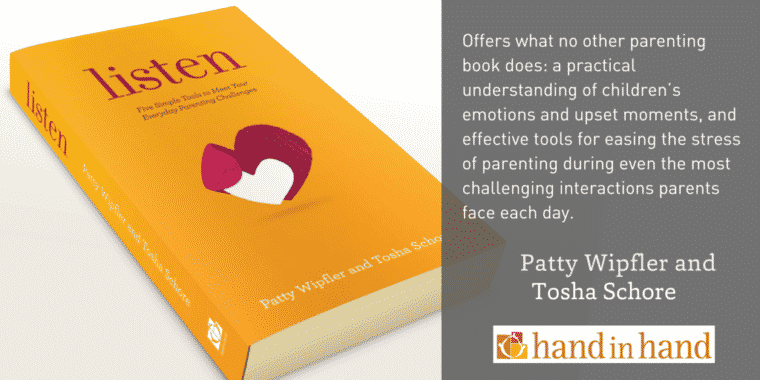

We’re often terribly frustrated when we try to get our children to cooperate. On this issue, there seem to be two camps. Many of us get so fed up with our inability to control our kids that we give up. We just pick up the toys or clear the table ourselves, but resentment builds over time, creating distance between ourselves and our children. We feel inadequate.
Our lack of confidence makes our children’s world feel shakier.

Those of us in the second camp get so triggered by lack of cooperation that we yell, shame, blame, or punish until the deed is done by force. Here, too, we feel badly. Anger and frustration reign. Our children can’t help but internalize the message that they are not good enough, which hinders their ability to learn and make friends.
In seeking cooperation, we must think of our children as partners in a relationship. Paying attention to connection before asking a child to cooperate is like greeting a neighbor and chatting a bit before mentioning that the fence between your yards needs repair. You honor the relationship, since it is the foundation for any positive action to follow.
A mother once came to me, furious at her two young children for not emptying their backpacks and putting their lunch boxes in the kitchen after school. She had tried “everything,” and they just wouldn’t listen. Instead, they would walk into the house, drop their things by the front door, and run to the living room to play. This mom could feel her frustration rising every afternoon at the anticipation of the standoff she knew was coming.
I pointed out that they’d been away from her all day long, doing what their teachers wanted. So rather than greeting them with a demand, it might work better to simply join them in play for ten minutes or so. Then she could try asking them to empty their backpacks. And it worked!
This was a fine example of a parent setting herself up for success by connecting first. When children feel connected to their parents and truly seen, cooperation comes naturally. Rather than ruffling up your feathers and preparing for a showdown with an uncooperative child, here’s how to use one of our
Listening Tools to build the cooperation you long for.
It's Called Special Time
We parents often feel urgent about getting things done right now, a feeling that tends to arise when we feel burdened and alone. We want to feel better, so we try to get the kids to sit down to lunch
now, or get the bedroom cleaned up
now, or get them piled into the car
now. And there are times to force cooperation immediately. When your child is darting out onto a busy street, you’ve got to scoop him up right away, no matter how insulted he may feel! But otherwise, to win cooperation, you need to allow a bit of time for connection between the two of you.
To build a climate of cooperation, you will want to create a balance between your generous yesses and the gift of no. When your yes is a warm one, the bond between you grows.
Special Time is one good way to say “Yes” to your child.
The tool lets him decide how to spend time with you, with no interruptions – no phone calls or emails, no laundry or dinner prep – for a set period of time that the parent decides.
As you allow him to show you his interests, your generous attitude will rub off on him. Special Time lets you limit your “Yes” with a timer, and limit how often you can offer it, so you don’t have to worry about being dominated by your child’s whims. On a good day, most of us can manage to love what our child loves for five or ten minutes. This provides the foundation for cooperation. Over time, your child will become more likely to be generous with you and with others, because he has your full-strength “Yes” behind him on a regular basis.
Taken from the book
Listen: Five Simple Tools to Meet Your Everyday Parenting Challenges.
Read a sample chapter here.
From the Hand in Hand Toolbox:


 Those of us in the second camp get so triggered by lack of cooperation that we yell, shame, blame, or punish until the deed is done by force. Here, too, we feel badly. Anger and frustration reign. Our children can’t help but internalize the message that they are not good enough, which hinders their ability to learn and make friends.
In seeking cooperation, we must think of our children as partners in a relationship. Paying attention to connection before asking a child to cooperate is like greeting a neighbor and chatting a bit before mentioning that the fence between your yards needs repair. You honor the relationship, since it is the foundation for any positive action to follow.
A mother once came to me, furious at her two young children for not emptying their backpacks and putting their lunch boxes in the kitchen after school. She had tried “everything,” and they just wouldn’t listen. Instead, they would walk into the house, drop their things by the front door, and run to the living room to play. This mom could feel her frustration rising every afternoon at the anticipation of the standoff she knew was coming.
I pointed out that they’d been away from her all day long, doing what their teachers wanted. So rather than greeting them with a demand, it might work better to simply join them in play for ten minutes or so. Then she could try asking them to empty their backpacks. And it worked!
This was a fine example of a parent setting herself up for success by connecting first. When children feel connected to their parents and truly seen, cooperation comes naturally. Rather than ruffling up your feathers and preparing for a showdown with an uncooperative child, here’s how to use one of our Listening Tools to build the cooperation you long for.
Those of us in the second camp get so triggered by lack of cooperation that we yell, shame, blame, or punish until the deed is done by force. Here, too, we feel badly. Anger and frustration reign. Our children can’t help but internalize the message that they are not good enough, which hinders their ability to learn and make friends.
In seeking cooperation, we must think of our children as partners in a relationship. Paying attention to connection before asking a child to cooperate is like greeting a neighbor and chatting a bit before mentioning that the fence between your yards needs repair. You honor the relationship, since it is the foundation for any positive action to follow.
A mother once came to me, furious at her two young children for not emptying their backpacks and putting their lunch boxes in the kitchen after school. She had tried “everything,” and they just wouldn’t listen. Instead, they would walk into the house, drop their things by the front door, and run to the living room to play. This mom could feel her frustration rising every afternoon at the anticipation of the standoff she knew was coming.
I pointed out that they’d been away from her all day long, doing what their teachers wanted. So rather than greeting them with a demand, it might work better to simply join them in play for ten minutes or so. Then she could try asking them to empty their backpacks. And it worked!
This was a fine example of a parent setting herself up for success by connecting first. When children feel connected to their parents and truly seen, cooperation comes naturally. Rather than ruffling up your feathers and preparing for a showdown with an uncooperative child, here’s how to use one of our Listening Tools to build the cooperation you long for.
